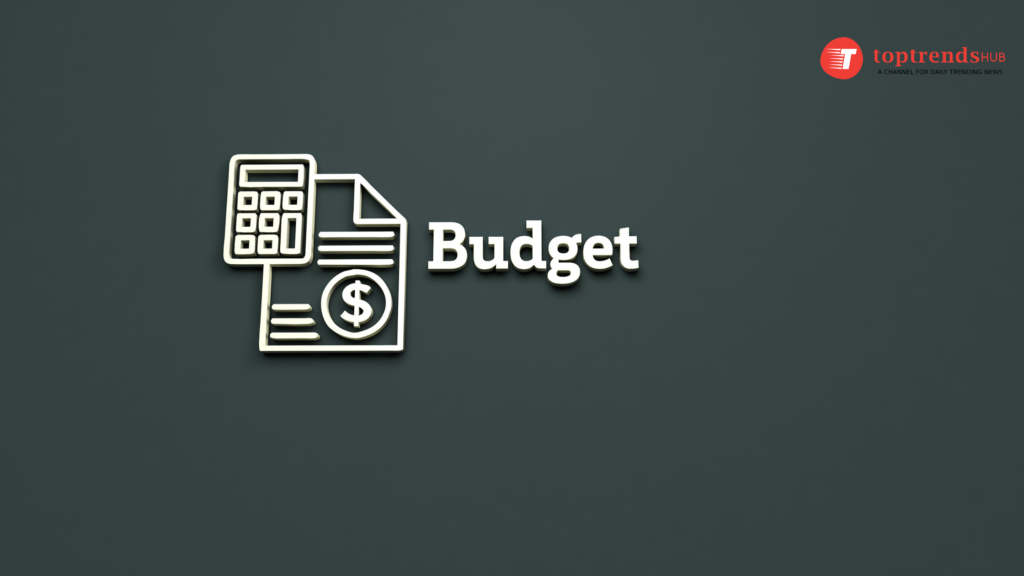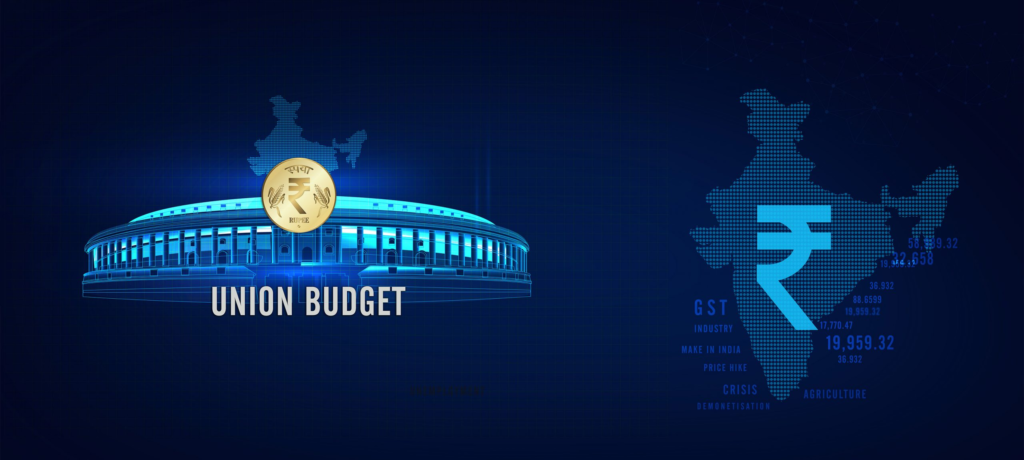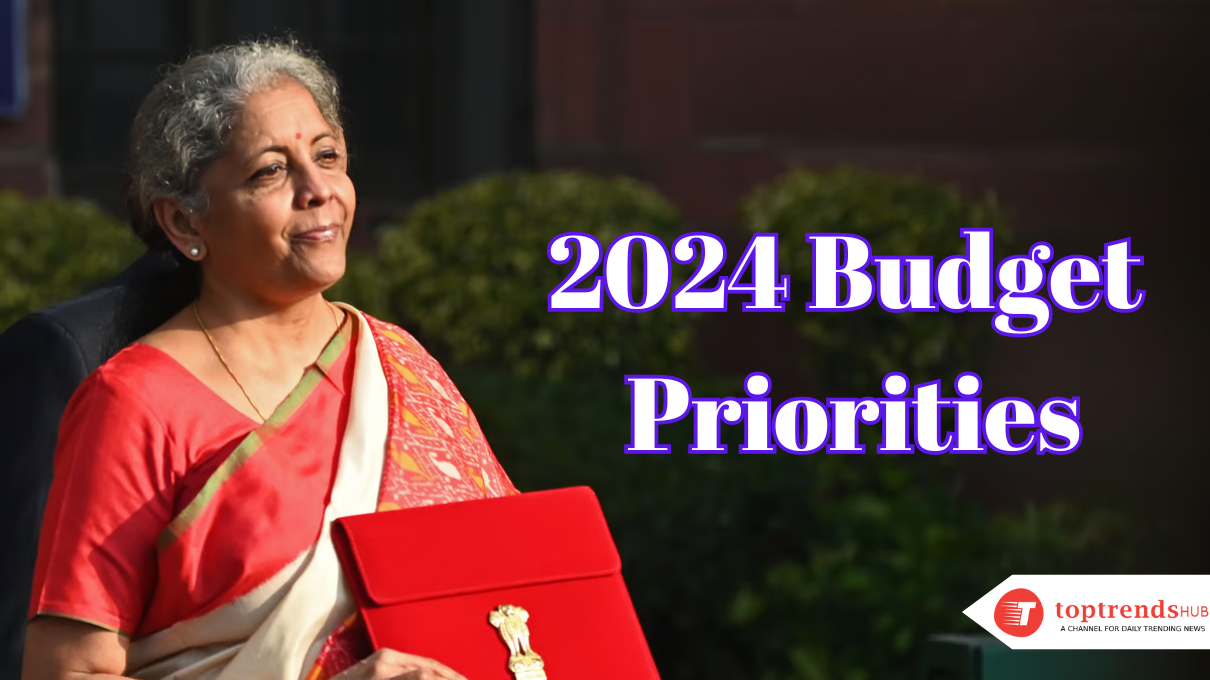Union Budget Updates: India on the Path to Becoming the Third-Largest Economy
Union budget 2024 We are dedicated to making India the third-largest economic power and achieving Viksit Bharat: PM Modi
Budget Highlights: Modi Focuses on Connecting Remote Areas with All-Weather Roads
The budget emphasizes developing all-weather roads to connect remote areas in rural regions. This initiative aims to improve accessibility, boost local economies, and enhance the overall quality of life for residents: PM Modi
Budget Focus: Modi Aims to Eliminate Poverty and Empower Low-Income Households
We are committed to eradicating poverty and empowering low-income households. By providing better access to education, healthcare, and financial services, the government aims to uplift marginalized communities and ensure inclusive growth: PM Modi
Union Budget: Vegetable Clusters Scheme to Boost Farmers’ Incomes, Says PM Modi
In line with our focus on increasing farmers’ income, we are introducing a scheme to develop vegetable clusters. This initiative will enhance vegetable availability nationwide, promote sustainable farming practices, and ensure better market linkages for farmers: PM Modi
Budget: Infrastructure and Highways Development in North-East
We are concentrating on enhancing infrastructure and highways in the North-Eastern region. This focus will promote regional development, improve connectivity, and integrate the North-East with the rest of the country, fostering economic growth and stability: PM Modi
Budget: Relief for Poor and Middle-Income Households, Says Modi
We have consistently provided tax relief to poor and middle-income households over the past ten years. This year, we continue that focus, aiming to reduce the financial burden and increase disposable income for these groups: PM Modi
Budget: Boost to Tourism Welcomed by Modi
India is now seen as an attractive investment and tourism destination. The budget emphasizes the tourism sector, aiming to develop infrastructure, promote heritage sites, and create employment opportunities, thereby boosting the economy: PM Modi
Budget: PM Welcomes Abolishment of Angel Tax
The Angel Tax has been removed. This move is expected to foster a more favorable investment climate for startups and entrepreneurs, encouraging innovation and economic growth: PM Modi
Union Budget: Opportunities for Startups and Innovation, Says PM Modi
This budget brings new opportunities for startups and the innovation ecosystem. By providing incentives, support, and infrastructure, the government aims to create a vibrant environment for entrepreneurial growth and technological advancement: PM Modi
Union Budget: Modi Praises Initiative to Spread Manufacturing Nationwide
The budget focuses on expanding manufacturing to every district in the country. This initiative will decentralize industrial development, create jobs, and boost local economies, contributing to overall national growth: PM Modi
Union Budget: MSME Sector Linked to Middle-Income Households

The MSME sector is closely linked with middle-income households, providing employment to low-income citizens. By supporting MSMEs, the government aims to strengthen this sector, enhance economic stability, and promote inclusive growth: PM Modi
Union Budget: Increase in Mudra Loan Limits, Says PM Modi
Mudra Loan limits have been increased, benefiting tribals, Dalits, and low-income groups. This expansion aims to provide better financial support, encourage entrepreneurship, and improve living standards among these communities: PM Modi
Union Budget: PLI Scheme Lauded Globally, Says Modi
The PLI scheme has received global acclaim. The newly announced employment-linked incentive scheme will offer skill development and internship opportunities for one crore youth, providing them with exposure to top companies and enhancing their employability: PM Modi
Union Budget: Emphasis on Manufacturing and Infrastructure, Says Modi
The budget places a strong emphasis on manufacturing and infrastructure. By investing in these sectors, the government aims to boost economic growth, create jobs, and improve the country’s overall development: PM Modi
Union Budget Statement: Dr. KC Ravi, Chief Sustainability Officer, Syngenta India Pvt Ltd & Chairman Crop Life India
The Finance Minister’s seventh Union Budget is a no-frills budget addressing the current realities and challenges of the agriculture sector. The announcement of releasing 109 high-yielding and climate-resilient varieties of 32 field and horticultural crops marks a significant step forward. Collaborative research between public institutions and the private sector will help develop newer climate-resilient varieties and farming practices for various agro-climatic zones, aiding farmers in navigating emerging challenges.
The Modi 3.0 government continues to emphasize technology and digital advancements. The digital crop survey for Kharif in 400 districts is another key announcement, strengthening digital public infrastructure for agriculture. It enhances transparency, empowers farmers with alternatives, and creates more opportunities.
We welcome the Government’s commitment to reviewing the Agricultural Research Setup, emphasizing the need to raise productivity and develop climate-resilient varieties. As a company dedicated to high-end R&D, we believe this will strengthen India’s capacity to deliver solutions tailored to diverse agro-climatic zones, benefiting many farmers.
The strategy to achieve “Atmanirbhar Bharat” in oilseeds like mustard, groundnut, sesame, and sunflower is a welcome move. It will conserve foreign exchange and boost domestic production. The private sector can play a significant role in this effort. The agrochemical sector was also expecting schemes like the production-linked incentive (PLI) scheme, a 200 percent weighted deduction on R&D income tax benefits, and rationalizing GST rates at par with other agricultural inputs.
Union Budget Announcements: ₹15,000 Crore for Amaravati Infrastructure
The Union Budget 2024-25 allocates ₹15,000 crore for the new capital project of Amaravati, Andhra Pradesh. This special infrastructure assistance aims to support the development of Amaravati, ensuring it becomes a modern and well-equipped capital. The Finance Minister, Nirmala Sitharaman, also introduced several measures to fulfill promises made in the Andhra Pradesh State Reorganisation Act 2014.

Union Budget Reaction: A P Sinha, Director of Farlense Group
A P Sinha, Director of Farlense Group, praised the Government of India’s forward-thinking agricultural budget for 2024-25. The budget allocation has increased to ₹1.52 lakh crore, a 21.6% rise from the previous year. Key initiatives include establishing Digital Public Infrastructure (DPI) for farmers, introducing 109 high-yielding and climate-resilient crop varieties, creating 10,000 bio-input resource centers, and expanding the Kisan Credit Card scheme to five states.
The Agri-Infrastructure Fund will see a significant boost to ₹30,000 crore, enhancing rural infrastructure like cold storage facilities, warehouses, and transportation networks. Additionally, the budget emphasizes employment generation through three schemes focused on job creation in rural areas, reducing urban migration.
Union Budget Announcements: FADA President Manish Raj Singhania’s Take
Manish Raj Singhania, President of FADA, shared his insights on the budget’s impact on the auto retail sector. The budget’s focus on inclusive growth, highlighted by initiatives for the poor, women, youth, and farmers, is commendable. Enhanced Minimum Support Prices for major crops and Phase IV of PMGSY are expected to boost rural incomes and connectivity, potentially increasing rural auto sales.
The emphasis on employment, skilling, MSMEs, and the middle class, along with significant infrastructure investments, will have a positive multiplier effect on the economy. Adjustments in personal income tax will enhance disposable incomes, fostering a favorable environment for auto sales. However, the sector needs continued support to navigate challenges like transitioning to green mobility and sustainable practices.
Union Budget Announcements: D. S. Negi, CEO of Rajiv Gandhi Cancer Institute & Research Centre
D. S. Negi, CEO of Rajiv Gandhi Cancer Institute & Research Centre, welcomed the government’s decision to exempt three additional cancer medicines from custom duties. This move aims to make essential cancer treatments more accessible and affordable. The proposed reduction in basic custom duty on x-ray tubes and flat panel detectors will support local manufacturing and ensure advanced medical technology is available to improve diagnostic accuracy and treatment outcomes for cancer patients. These measures are expected to significantly benefit cancer patients across India.
Union Budget Announcements: Arjun Prasad, Co-Founder of QX Lab AI
Arjun Prasad, Co-Founder and Chief Strategy Officer of QX Lab AI, highlighted the abolition of the angel tax as a monumental step for India’s startup ecosystem. This change will boost entrepreneurial spirit and drive innovation, particularly in the AI sector. Upgrading 1,000 industry training institutes in a Hub and Spoke arrangement will bridge the skill gap and prepare youth for future jobs.
The emphasis on women-led development and AI-driven upskilling for women showcases a commitment to gender equality and inclusive growth. Public investment in digital infrastructure, combined with private sector innovation, will enhance access to essential services. Initiatives like the Jan Vishwas Bill and the Anusandhan National Research Fund will propel research, innovation, and ease of doing business, promoting economic activities and fighting inequality through inclusivity.
Union Budget Announcements: Awais Ahmed, Founder and CEO of Pixxel
Awais Ahmed, Founder and CEO of Pixxel, expressed enthusiasm about the ₹1,000 crore VC fund for the space sector announced in the Union Budget 2024-25. This fund will provide crucial financial support to innovative startups and companies, enabling them to scale their technologies and contribute to India’s space ambitions.

The government’s commitment to expanding the space economy fivefold in the next decade aligns with this initiative. At Pixxel, there is excitement about the opportunities this fund will create to advance space technology and drive economic growth, marking a significant step forward for India in the global space industry.
Union Budget Announcements: Ninad Karpe, Founder and Partner at 100X.VC, on Budget 2024
The abolition of the Angel Tax stands out as a bold and transformative decision by the Finance Minister. This move will significantly energize the startup ecosystem, marking a major shift in the landscape. Additionally, the allocation of ₹1000 crore to boost the space economy is a commendable step. Overall, this budget strikes a well-considered balance, focusing on employment, skill development, and infrastructure. These measures are set to invigorate economic activity and facilitate job creation.
Union Budget Updates: Reduction in Customs Duties on Precious Metals
The budget outlines a reduction in customs duties on gold, silver, and platinum. This change aims to ease the financial burden on the gems and jewellery industry. For more details on the revised customs duties, click here.
Union Budget Highlights: Key Announcements
Explore the key highlights of the Budget 2024-25 here. The budget introduces several significant changes and initiatives that will impact various sectors.
Union Budget Announcements: Vikram Chachra, Founding Partner at 8i Ventures, on Taxation
Removing the Angel Tax is a welcome and long-overdue reform for the Indian startup ecosystem. This policy shift demonstrates the government’s commitment to fostering innovation and supporting early-stage ventures. By eliminating this tax, the investment landscape will become more dynamic, attracting both domestic and international investors. This moves promises to enhance the vibrancy of the startup ecosystem and bolster confidence among global investors.
Budget 2024 Announcements: Focus on Youth Employment and Tax Revisions
The Finance Minister’s budget emphasizes youth employment, tax revisions for the salaried class, and support for MSMEs and manufacturing. While the budget includes positive measures for the youth, salaried individuals, and farmers, it introduces higher Securities Transaction Tax (STT) on futures and options trades, and revises capital gains taxation rates and holding periods.
Budget Updates: Policy for Energy Transition
The budget outlines a policy document focused on energy transition strategies and decarbonizing challenging sectors like refineries and steel production. It also emphasizes advancements in nuclear energy and thermal power generation and proposes the development of pumped storage systems for energy storage. These measures aim to advance India’s energy infrastructure and sustainability efforts.

Budget 2024 Updates: Sandip Bhammer, Founder and Co-Managing Partner at Green Frontier Capital, on Budget
The Union Budget 2024 introduces a ₹1000 crore VC fund to support early-stage businesses and drive innovation. This funding will enhance the entrepreneurial landscape and foster technological growth. Additionally, the budget’s collaboration with private enterprises to establish Bharat compact reactors is a forward-thinking move that will bolster energy security and reduce carbon emissions. The focus on climate taxonomy for green investments will attract capital to eco-friendly projects, reflecting India’s commitment to climate action and responsible financial practices.
Budget Announcements: Emoha Eldercare’s Perspective
The 2024 budget’s focus on increasing women’s workforce participation through hostels, creches, and skilling programs is praiseworthy. Women, often balancing childcare and elder care, face career challenges due to these responsibilities. At Emoha, we believe integrating senior care into employee benefits can unlock the full potential of women in the workforce. The recent rise in female workforce participation could see further growth with this approach. We encourage corporations to partner with senior care providers to align with the government’s gender diversity goals and create inclusive work environments.
Budget Announcements: Rishabh Jain of CEEW on Critical Minerals
The announcement of a Critical Mineral Mission for India aims to develop capabilities in the critical minerals supply chain and enhance competitiveness in sectors like electronics and defense. This initiative will strengthen India’s position in the global critical minerals market and support the country’s climate goals. The focus on domestic mining and recycling will secure the supply chain and boost clean energy sectors.
Union Budget Updates: Sensex and Nifty Reaction
Following the Finance Minister’s announcement of increased STT on futures and options, both Sensex and Nifty experienced a decline. Read more for detailed insights.
Budget 2024 Announcements: Capital Gains Exemption Increase
The finance minister has proposed raising the capital gains exemption limit on certain financial assets to ₹1.25 lakh annually. This change aims to benefit the middle and upper-middle class, alongside a hike in STT for futures and options.
Budget 2024 Updates: Kathir Thandavarayan, Partner at Deloitte India, on MSMEs
“The revised credit guarantee schemes for MSMEs in manufacturing signal ongoing support for these crucial players in the value chain. This scheme will aid in expanding capacities and enhancing market reach, aligning with the government’s ‘Make in India’ initiative.”
Union Budget Announcements: Anil Joshi, Managing Partner at Unicorn India Ventures, on Space Tech
The ₹1000 crore fund for space tech demonstrates India’s ability to develop innovative solutions cost-effectively. This funding will significantly support space tech startups and contribute to India’s space ambitions. It is a promising start for the sector’s growth.
Union Budget Announcements: Pankaj Mohindroo, Chairman of ICEA, on Custom Duty Reduction
We commend the government for its landmark budget, particularly the reduction in BCD for mobile phones, PCBA, and chargers. This move will enhance manufacturing and export competitiveness in the electronics sector. We look forward to further tariff rationalization in the coming months.
Union Budget Updates: Customs Duty Reduction
The finance minister has proposed reducing basic customs duty on gold and silver to 6% and on platinum to 6.4%. Additionally, basic customs duty on ferronickel and blister copper will be removed, while the duty on certain telecom equipment will increase.
Budget Announcements: Comprehensive Review of Income Tax Act
The government plans to conduct a thorough review of the Income Tax Act to simplify it and introduce a standard operating procedure for TDS defaults. Additionally, two tax exemption regimes for charitable trusts will be consolidated into one.”
Surge in Shrimp Product Stocks Following Budget Allocation
Shares of companies involved in shrimp production and export experienced a significant boost recently. Finance Minister Nirmala Sitharaman announced that the government will finance shrimp farming and marketing, leading to a surge in stock prices for these firms. The Union Budget introduced a reduction in the basic customs duty on shrimp to 5 percent, which further fueled this positive momentum.
For instance, Zeal Aqua’s stock surged by 9.27%, Kings Infra Ventures saw an 8.15% increase, Coastal Corp climbed 7.55%, Apex Frozen Foods jumped 7.51%, and Waterbase experienced a 5.51% rise on the Bombay Stock Exchange (BSE).
Impact of Revised Tax Regime on FMCG Sector
The Finance Minister also revealed updates to the tax regime, including a revised standard deduction from ₹50,000 to ₹75,000 for individuals opting for the new tax system. This change is expected to save individuals around ₹17,500 in taxes. Companies in the FMCG sector, such as HUL, ITC, Dabur, and Nestle, stand to benefit directly from these changes. Suppliers to these FMCG giants, like Polyplex and Uflex, will also see positive effects. Additionally, increased savings are likely to boost investments in wealth management and stock brokerage services.
Fiscal Consolidation Efforts Highlighted by CRISIL
The government has strategically utilized additional revenues to expedite fiscal consolidation. Consequently, by reducing the fiscal deficit to 4.9%, the revised estimate not only alleviates government security yields but also opens up new opportunities for corporate borrowings. Furthermore, CRISIL anticipates that sovereign yields will stabilize at 6.8% by the end of this fiscal year. Thus, these measures collectively contribute to a more stable economic environment and foster enhanced financial flexibility.
Internship Opportunities for Youth
A comprehensive scheme to offer internships to one crore youth across top 500 companies over the next five fiscal years aims to enhance practical work experience. Companies will cover training costs, with 10% of internship expenses funded through CSR initiatives. This program will help build a skilled workforce tailored to industry needs.
GST Rate Rationalization and Anti-Profiteering Concerns
The GST rate rationalisation may spark a new wave of anti-profiteering complaints, particularly if the reduced GST rates take effect before the sunset date. Companies, especially those in the B-to-C sector, should prepare by learning from past anti-profiteering litigations to mitigate potential exposure.
Improvements in Insolvency and Bankruptcy Code (IBC)
Speedy resolution remains a core aspect of the IBC, though implementation delays have been a challenge. Developing an infrastructure that includes AI could significantly enhance the effectiveness of the IBC, and this Budget raises hopes for such advancements.
Infrastructure Sector Developments
The inclusion of Viability Gap Funding (VGF) for infrastructure development is crucial. While road development has progressed, careful planning and execution are necessary for other projects. With a strategic approach, these initiatives could drive substantial economic growth.
Power Sector Roadmap and Energy Security
The Finance Minister announced plans to develop a roadmap for transitioning hard-to-abate industries from energy efficiency targets to emission targets. New regulations will support this shift. The government will also facilitate investment-grade energy audits for traditional micro and small industries in 60 clusters and provide financial support for cleaner energy transitions. This scheme will expand to another 100 clusters in the future.
Energy Security and Renewable Energy Initiatives
Addressing India’s growing energy demands and simultaneously meeting Nationally Determined Contribution (NDC) targets, the Economic Survey underscores the critical need for a diversified energy mix. To this end, the introduction of a new 2400 megawatt power plant, coupled with the PM Suryaghar Muft Bijli Yojana, marks significant progress.
Specifically, this scheme, which provides free solar electricity to 1 crore households, not only represents a major step towards strengthening energy infrastructure but also advances the broader goal of promoting renewable energy adoption. Consequently, these initiatives collectively contribute to a more sustainable and resilient energy future for the country.
Revenue Collections and Tax Net Expansion
Improved revenue collections are being utilized to maintain capital expenditure and trim the fiscal deficit. The government is broadening the tax net to enhance revenue efficiency, as observed by CRISIL.
Direct Tax Changes and New Tax Regime
The new tax regime includes revised tax slabs and deductions. Notably, the standard deduction for salaries has increased from ₹50,000 to ₹75,000. New tax slabs now include:
- ₹0 – ₹3 lakh: NIL
- ₹3 – ₹7 lakh: 7%
- ₹7 – ₹10 lakh: 10%
- Above ₹15 lakh: 30%
Under this regime, salaried employees can save up to ₹17,500.

Taxation and Exemptions
The Budget proposes an increase in duties on telecom equipment imports to 15% from 10%. Additionally, the limit for capital gains exemption has been set at ₹1.25 lakh per year, and listed financial assets held for more than a year will be classified as long-term. Unlisted bonds and debentures will attract capital gains tax as applicable.
Simplification of Tax Regime and Social Security
The government intends to streamline tax regimes for foreign shipping companies and professionals working in multinational corporations who invest in movable assets abroad. Additionally, as part of social security measures, the plan includes raising the NPS deduction from 10% to 14% of an employee’s salary. Meanwhile, to further support the e-commerce sector, TDS rates for e-commerce operators will be lowered, and credits for TCS will be applied to salary TDS. Consequently, these changes aim to enhance financial efficiency and support both domestic and international economic activities.
Abolishment of Angel Tax and Tax Exemptions
The Budget eliminates Angel Tax for all investor classes and merges two tax exemption regimes for charities into one. The period for exporting goods imported for repairs has been extended from six months to one year.

Budget 2024 Updates: Key Changes and Proposals
- Boosting Domestic Telecom Manufacturing: To strengthen the domestic telecom sector, the proposal aims to increase duties on specified telecom equipment from 10% to 15%. This move supports the growth of local manufacturing.
- Agriculture Development Support: The Agriculture Minister of Andhra Pradesh has expressed gratitude towards the central government for its support in capital and backward region development. This acknowledgment highlights the government’s commitment to regional development.
- Telecom Equipment Duty Adjustment: The Budget proposes raising the Basic Customs Duty (BCD) on specified telecom equipment from 10% to 15%, aiming to encourage domestic production and reduce import dependency.
- Reducing Production Costs: To lower production costs, the Budget includes measures to reduce BCD on ferro nickel and remove it on oxygen-free copper. These adjustments will benefit the steel and copper industries.
- Customs Duty on Precious Metals: The Budget proposes reducing the customs duty on gold and silver to 6%, alongside a reduction in BCD on ferro nickel, aimed at lowering costs for the jewelry and electronics sectors.
budget 2024
- Streamlining Export Duties: The Budget will simplify and rationalize the export duty on raw hides, improving the efficiency of the export process.
- Record Seafood Exports: Seafood exports have reached an all-time high, surpassing ₹60,000 crore, reflecting the sector’s robust performance and international demand.
- Adjusting Duties on Down Filling Material: The Budget plans to reduce the BCD on real down filling material from duck or goose, which will impact the cost of manufacturing insulated products.
- Exempting Shrimp Feed Manufacturing: Custom duty will be exempted for the manufacture of shrimp feed, supporting the aquaculture industry’s growth.
- Solar Energy Sector Update: The Budget will not extend the current customs duty exemption for solar energy equipment. However, it aims to expand the list of exempted capital goods in the solar sector, highlighting the critical role of energy transition.
- Critical Minerals and Mobile Phones: Custom duties on 25 critical minerals will be fully exempted, while the BCD on mobile phones, including mobile PCBs and chargers, will be reduced to 15%. This adjustment reflects the Indian mobile phone industry’s maturity and aims to boost domestic production.
Union budget 2024
- Cancer Medicines Duty Exemption: The Budget includes a full exemption of custom duty on three more cancer-related medicines, enhancing accessibility for patients.
- Review of Custom Duty Rates: The government will review custom duty rates over the next six months to ensure they align with economic needs and trends.
- Simplifying GST Structure: The Budget emphasizes efforts to simplify the GST tax structure, aiming to decrease tax incidence for the common man and enhance revenue for both central and state governments.
- Infrastructure Sector Capital Expenditure: Infrastructure sectors will see significant investment, with a focus on maintaining capital expenditure in line with previous announcements. This includes addressing a shortfall in capex growth to meet targets for the fiscal year.
- E-commerce and Job Creation: The Budget’s focus on e-commerce hubs will improve efficiency in the D2C ecosystem, benefiting small vendors and aggregators. This initiative aims to drive growth in the automotive sector, particularly in the two-wheeler segment.
- Housing Market Developments: The PMAY2 credit-linked subsidy scheme will significantly boost the affordable housing market, potentially accelerating growth in this sector.
- Climate Finance and Green Projects: The Budget outlines plans for developing a taxonomy for climate finance and supporting the recycling of critical minerals, which will aid in the availability of materials for green projects.
- Industrial Development and Energy Efficiency: Development of an industrial node at Gaya and energy audits for MSMEs in various clusters will support cleaner energy transitions and industrial growth.
- Support for Employment and Skills: The government will provide ₹1.48 lakh crore for employment and employability initiatives, focusing on first-time employees and offering incentives for job creation in the manufacturing sector.
Union budget 2024
- Transportation and Infrastructure Projects: Significant investment in road connectivity projects, including the construction of major highways and bridges, will boost demand for construction materials and infrastructure development.
- Urban Development Initiatives: The Budget plans to enhance water supply, sewerage treatment, and stormwater drainage services for large cities. Additionally, it will support the development of industrial parks and flexible leasing structures for aircraft and ships.
- Tourism and Real Estate: Nalanda will be developed as a tourist center, and policies will be introduced to support the residential real estate sector, including lower stamp duties for women property buyers.
- Digital Infrastructure and Property Records: An IT-based system for property records and GIS mapping will improve urban land record management and accessibility.
- Support for MSMEs and Green Transition: Initiatives to facilitate access to credit for MSMEs and support the greening of the sector will address key challenges and promote sustainable growth.
- Housing and Infrastructure Investment: The Budget’s allocation for PMAY – Urban and other infrastructure projects reflects a strong commitment to enhancing residential and commercial development.
Budget 2024 Highlights: Key Announcements and Developments
- Addressing Housing Needs: To begin with, the government plans to tackle the housing needs of 1 crore urban poor through the PM Awas Yojana-Urban. With an investment of Rs 10 lakh crore, they aim to construct new dwellings, thereby alleviating housing shortages in rapidly growing cities.
- Investment in Education and Employment: Furthermore, the budget allocates approximately 30% more funds for Education, Skilling, and Employment. Specifically, the increase from Rs 1.13 lakh crore to Rs 1.48 lakh crore highlights the government’s commitment to significantly enhancing employment and employability across the nation.
- Development of Large Cities: In addition, the budget outlines major development projects for 14 large cities, each with populations exceeding 30 lakh. These initiatives will focus on improving infrastructure and overall quality of life in these urban areas.
- Expansion of SIDBI Branches: Moreover, to better serve MSME clusters, SIDBI will open 24 new branches this year. This expansion is expected to provide greater support for small and medium-sized enterprises, thereby promoting business growth and stability.
- Transit-Oriented Development: Simultaneously, the budget emphasizes transit-oriented development in 14 large cities. This strategy is designed to enhance urban mobility and reduce congestion by integrating transportation systems with urban planning.
- Creative City Redevelopment: Additionally, a new framework will guide the creative redevelopment of cities. This initiative will focus on brownfield sites, aiming to formulate policies that enable efficient and sustainable urban regeneration.
- Climate-Resistant Crops: Moving on, Finance Minister Nirmala Sitharaman announced the development of 109 climate-resistant crop varieties across 32 categories. Companies like Kaveri Seeds and Dhanuka Agritech will benefit from these research-based setups, which are intended to improve productivity and resilience in agriculture. In parallel, a strategy will be developed under the Atmanirbhar Oilseeds Abhiyaan to achieve self-reliance in oilseeds, including mustard, sesame, sunflower, groundnut, and soybean.

budget 2024
- Establishment of Additional Tribunals: To further streamline legal processes, the budget introduces additional tribunals to handle cases under the Companies Act. This move aims to expedite legal proceedings and enhance the efficiency of the judicial system.
- National Company Law Tribunal Updates: Furthermore, the National Company Law Tribunal has successfully recovered Rs 3.3 lakh crore for creditors and resolved 28,000 cases involving Rs 10,00,000 crore. These results underscore the tribunal’s effectiveness in managing large-scale financial disputes.
- Support for Organic Farming: In another development, CRISIL reports that the establishment of 10,000 need-based bio-inputs units will bolster organic farming. Given that organic farming has grown at a compound annual growth rate of 23% from 1990 to 2023, this expansion comes at a crucial time, addressing the adverse effects of chemical fertilizers on crop yields.
- Voluntary Closure of LLPs: Additionally, the budget extends accelerated corporate exit options for the voluntary closure of LLPs. This measure is designed to simplify the process for businesses looking to wind down operations.
- Integrated Technology Platform: Finally, a new integrated technology platform will be set up to enhance the resolution of Insolvency and Bankruptcy Code (IBC) cases. This platform aims to improve transparency and outcomes in insolvency proceedings.
Overall, Budget 2024 presents a holistic approach to urban development, educational advancement, agricultural innovation, and legal efficiency, thus fostering growth and sustainability across various sectors.






